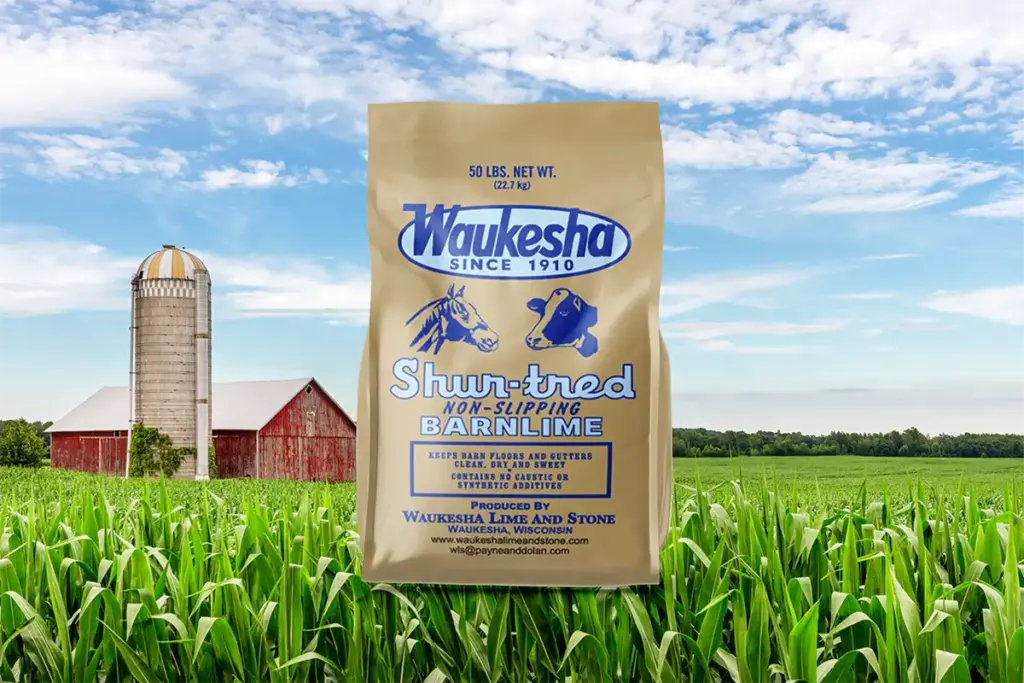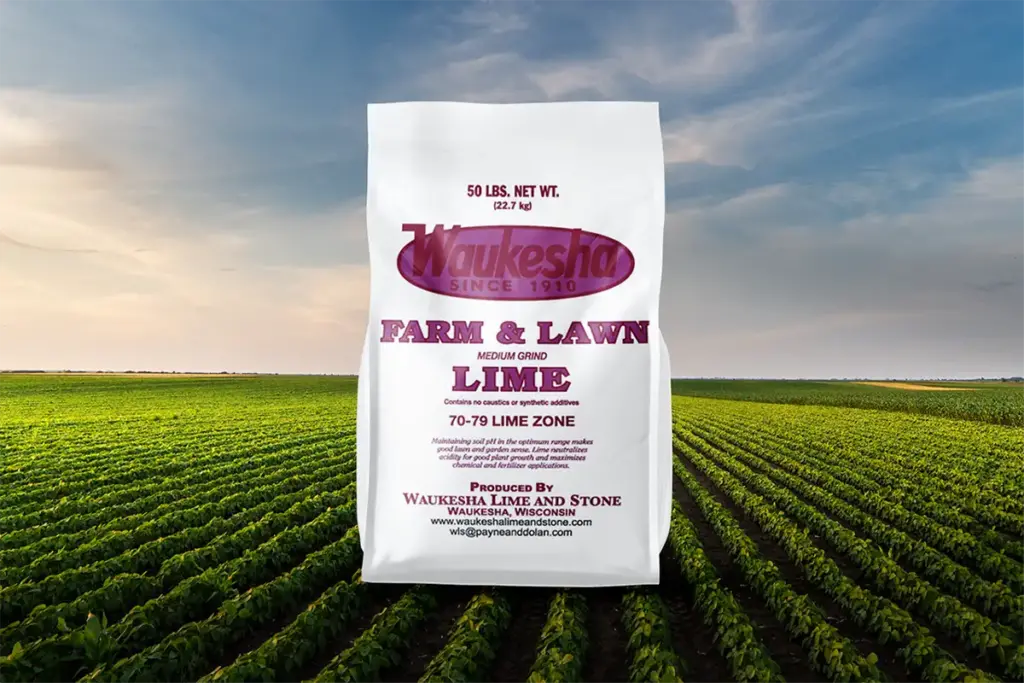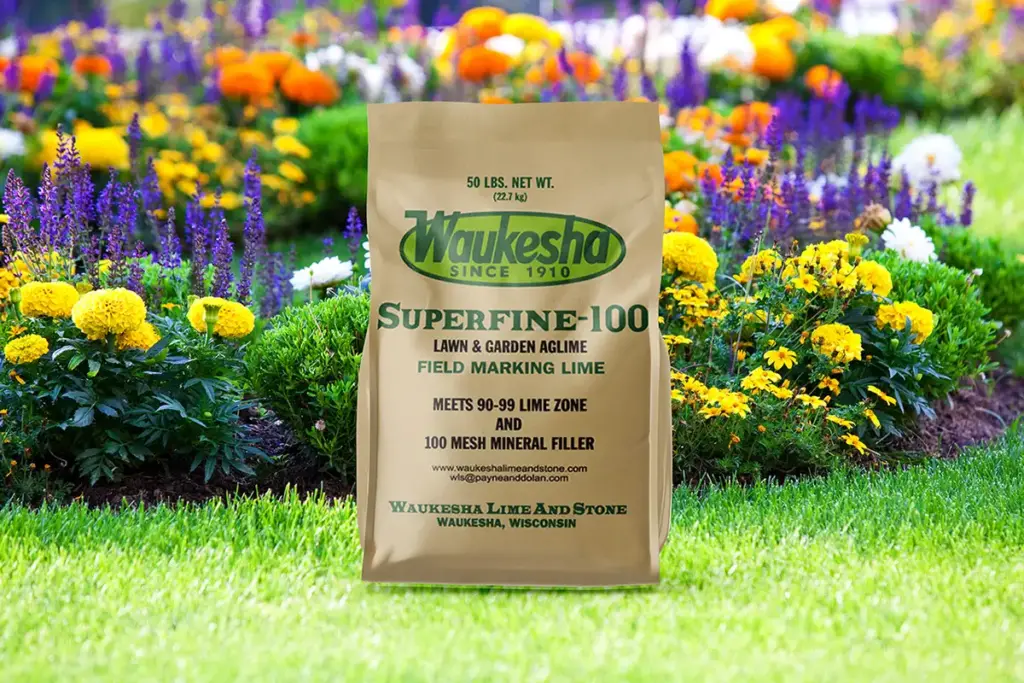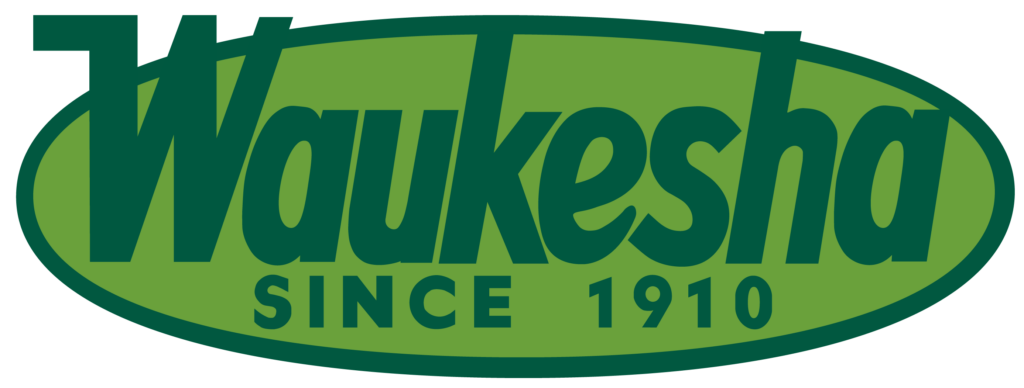Agricultural lime, often called aglime or simply lime, is a soil amendment made from crushed limestone or dolomite rock. It improves soil pH and gives crops and plants essential calcium and magnesium nutrients. Lime is commonly used in agriculture to address soil acidity, enhance nutrient availability, and promote healthier plant growth.
Waukesha Lime and Stone has provided homeowners, gardeners, and farmers with high-quality agricultural lime for over 100 years. Our Farm and Lawn and Superfine lime products help provide valuable nutrients that reduce soil acidity, loosen soils, maximize fertilizer applications, and promote good plant growth. Our Shur Tred Barnlime is a product used by dairy farmers, hobby farmers, and other livestock owners to keep barn floors, horse stalls, kennels, and animal pens dry, clean, and safe while providing traction to prevent occupants from slipping.
For dairy and hobby farmers, agricultural lime offers several benefits and uses:
Soils can become acidic over time due to rainfall, leaching, and certain farming practices. Lime raises the soil’s pH, making it less acidic and more suitable for optimal plant growth.
Aglime provides calcium and magnesium, essential nutrients for plant development and overall soil health. Calcium is vital for cell wall structure and root development, while magnesium plays a role in chlorophyll formation.
Balanced soil pH allows plants to absorb nutrients from fertilizers effectively. Agricultural lime helps improve nutrient availability by optimizing the soil’s chemical environment.
Lime promotes the aggregation of soil particles, leading to improved soil structure, water infiltration, and drainage. This is particularly important for maintaining aeration and reducing soil compaction.
Due to their nitrogen-fixing abilities, dairy farmers often favor clover and legume crops. Lime enhances the growth of these crops by creating a more favorable environment for their development.
Manure can contribute to soil acidity on dairy farms. Applying aglime helps neutralize the acidifying effects of manure, improving soil quality for crop growth.
Agricultural lime application to pastures and forage crops can increase productivity and nutrient content. It encourages the growth of high-quality grasses and legumes essential for dairy feed.
Proper soil pH can discourage the growth of certain weeds and pests, indirectly contributing to better crop yields.
Using agricultural lime as part of a comprehensive soil management strategy can lead to long-term benefits such as reduced erosion, improved water retention, and increased organic matter decomposition.

Shur Tred Non-Slipping Barnlime is a non-slip coarse ground lime used by dairy farmers, hobby farmers, and other livestock owners for over 100 years to help keep animals safe by providing better traction. Shur Tred Barnlime can also be spread on fields and gardens to enrich soils and promote increased crop production. In addition, it will increase the efficiency and productivity of your fertilizer investment.

Farm & Lawn Medium Grind Lime is a medium grind lime product that provides valuable nutrients that help reduce soil acidity & loosen soils. It neutralizes soil acidity and raises pH. Farm & Lawn can also help to minimize fertilizer applications and promote good plant growth. Farm & Lawn can be used on gardens, farm fields, lawns, and household plant soils.

Superfine-100 Lawn & Garden Aglime is our finest grind lime and our fastest-acting lime. It can be applied at any time of the year and used on new lawns, established lawns, gardens, and wildlife pots. It neutralizes soil acids and raises pH to make it more productive and increase fertilizer efficiency. It is also great for athletic field marking. Commercially, Superfine can be used as a mineral filler for epoxies, hot mix asphalt, and glass production.

Waukesha Lime & Stone products can be found at Cenex Stores, Tractor Supply Co., Blain Supply, and Rural King stores.
Contact a Walbec expert today to learn how our high-quality materials can benefit your project.

© Walbec Group
Privacy Policy | Terms & Conditions
Site by Lion Tree Group
Waukesha Lime & Stone has been part of the Wisconsin landscape for over 100 years. It is poised for the next 100 with new products geared toward the changing agricultural texture of the state. The company features two quarries and stretches across 40 acres with its boundary of Waukesha. The Fox River flows through it along with a highway and a railroad, making for easy distribution.
At its heart, our west quarry slices nearly 230 feet deep into an extraordinary place, a section of the earth where two plates collide in a fault line. Geologists say all of our quarries hold considerable scientific, economic, and historical importance. They provide the most complete selection of Silurian rocks exposed in southeastern Wisconsin, yield the world’s most diverse soft-bodied Silurian biota, and contain one of the best fault exposures around. They have been included as stops on geological field trips since 1937.
The quarry has been in continuous operation since 1911 but dates back to the early 1840s. The census of 1850 shows eight men employed at what became known as the Hatfields’ quarry, run by a prominent family in the stone business. They built the towering limekilns on the nearby hill, which is listed on the National Register of Historic Places.
The football field at Carroll College, the state’s oldest private college, was the first company quarry. At the turn of the century, many were in the area, producing stone for resort hotels built as the white-rocked area drew people from Chicago and elsewhere to partake of the “curative” lime spring waters.
Today, Waukesha Lime & Stone produces crushed, ground, and powdered stone, dolomite, and limestone. The quarry continues to produce a special type of stone that our farmers appreciate for its whiter color.
The operation involves the east and west quarries, a scale house and office building, bag plant, a shop, and eight portable crushing plants. After the stone is blasted free in the quarry, a crusher plant separates it into eight different products ranging from riprap boulders to powder.
Our products are primarily found in feed mills and garden centers across Wisconsin, portions of Minnesota, and Illinois.
At Waukesha Lime & Stone, we focus on the future and develop different products to meet the changing marketplace. We’re experimenting with decorative stone, focusing more on dog kennels, where lime is used as a deodorizer, and exploring options within the changing dairy industry.
Our Shur-Tred non-slipping barn lime is its biggest seller. The medium grind is also popular with homeowners for lawn use, and the company is tapping into the escalating equine market with its superfine product.
One lime we do not produce is hydrated lime. Unlike the dolomite lime produced at the Waukesha quarry, hydrated lime undergoes a process that changes its chemical composition. When added to water, the product makes acid and is often used in outhouses and rendering operations. It is a substance that must be handled with great care. Our lime is different. It is ground and dried limestone used in barns to deodorize, sanitize, provide traction, and reduce the ammonia smell.
"*" indicates required fields